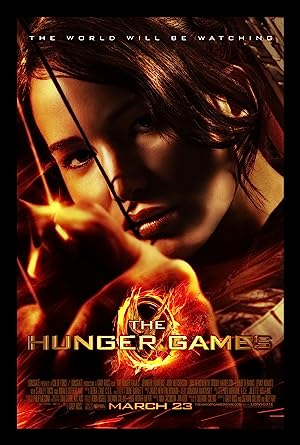If you like dystopian scenarios, then the books must be read and I would definitely recommend them over the movie. The books appeal to younger audiences because it grapples with and sensationalizes situations that they have to deal with now: inability to rely on parents/guardians, unable to trust institutional authority, having to be media savvy, dealing with lack of privacy, economic insecurity and the trauma of being placed in inappropriate situations.
In contrast, the movie, while an adequate representation of the first book in The Hunger Games series, misses crucial gender & racial themes implicitly raised in the book, and the special effects with respect to the wardrobe felt dated even watching it soon after its release. The second half is stronger than the first.
Regarding gender issues, the movie fails to make Katniss as unflinchingly dogged as portrayed in the book. I do not blame the actress for this, but the writers and the directors. The movie writers purposely stress the likeability and vulnerability of Katniss whereas in the first book, I would parallel Katniss to James Bond’s mental state in Daniel Craig’s Casino Royale: outwardly cruelly efficient with brief flashes across the face of the cracks developing inside. Because the movie writers are not effectively pacing out her psychological development, I’m not sure how they’re going to deal with the events of book 3, Mockingjay, when she will really need to fall apart and subconsciously be suicidal.
I think that the movie writers could not really relate to Katniss, a teenage girl, in those terms, but instead could relate to the gamekeeper and expanded his role accordingly, which I actually thought was a good move, but not if it was at the price of the protagonist’s character. Ultimately I didn’t think that the movie could handle the idea of a tough teenage girl.
In addition, the racial dynamic of the movie is problematic. I expected and had no problem that the people of District 12 were no longer olive skinned, light eyed people because they went to a Depression era feel of people of the panhandle which has visual historical significance for an American audience, but I did think that it was interesting that though the book portrays the majority of the people in power as raceless, but visual, inhuman freaks (weird colors, tattooed, etc) or merchant class (predominantly Caucasian features: blond, blue eyed), the movie shows that many of the people behind the scenes in the Hunger Games production are neither, but specifically black normal looking people, I began to wonder why, especially since the book singled out Cinna as the only one in the Capitol with no ostentatious markings, just a black man with gold eyeliner.
I watch many movies and usually the bit characters with few lines are not black so getting black characters in minor roles is something that I notice. The film devotes time to show a black woman developing the muttation that will terrorize the three finalists at the end of the character. There are other behind the scenes black characters who play a similar role in the movie, but when she appeared, I began to ask myself why casting decided to cast normal looking black people as in power and delighted to be in a job that basically is devoted to destroying young children. Are we seeing the cultural backlash to the Obama administration? I’m not saying definitely. Just a thought.
In addition, I believe that the movie downplayed the starvation and oppressive aspects of the regime. For instance, in the first hunting scene, the characters laugh because they don’t get to kill the deer and settle for birds. Peeta and Katniss turn down food out of moral outrage pre-Games. Katniss revels in her rebellion in her pregame display for the gamekeeper and judges instead of being upset and angst ridden over her loss of control over her temper. Why did the movie downplay the issues of economic justice and government oppression and monitoring in the teens’ daily life? Is this the cultural backlash to the Occupy movement? Again, it is just a thought, but such a huge contrast to the books that there has to be some reason for downplaying the Big Brother feel of the books.
I thought that Elizabeth Banks was the perfect Effie and applaud Woody Harrelson as Haymitch although I was distressed that the movie writers created new, less effective lines for him than the lines provided by Suzanne Collins. Not one “Stay alive.” One perfect reimagining of a character was Donald Sutherland’s reimagining of President Snow, especially his speech about underdogs. Even though he is not the weak, decaying, snakelike freakshow of the book, he is a soft-spoken sinister figure that terrifies convincingly with a whisper.
Another mistake: the children of District 2 & 3, professional tributes, were more portrayed as a clique of mean kids at school as opposed to ruthless, steely eyed killers so perhaps the movie’s reluctance to accurately portray Katniss was not a reluctance to portray strong female characters, but kids as capable of killing professionally and unhesitatingly.
Stay In The Know
Join my mailing list to get updates about recent reviews, upcoming speaking engagements, and film news.




